Potty Training A Stubborn Puppy
May 27, 2021 2021-06-04 11:20Table of Contents
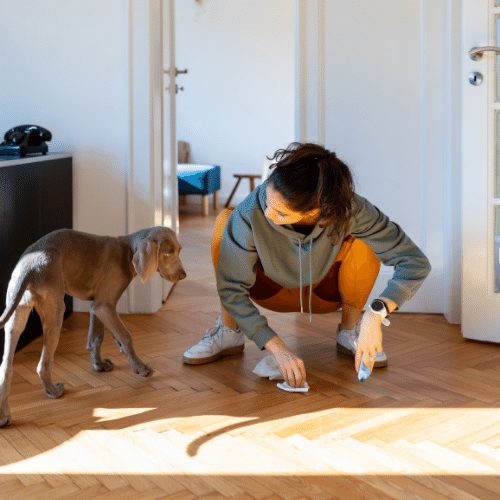
Potty training can be one of the most frustrating parts of raising a puppy. You think that you did everything correctly, and still: There are daily accidents that soil your home and ruin your fun with your puppy. How do you make your pup understand that he should not potty wherever he wants? How do you potty-train an especially stubborn puppy? We have potty-training solutions for you!
How do you potty-train a stubborn puppy?
Does it seem like your puppy is trying to defy you on purpose? First of all, please know that no pup is making you clean up his accidents out of spite or to annoy you. Your puppy loves you and wants to bond with you. Pee and poop accidents are never a sign that he is dumb or that he is working against you.
It’s really important to not become frustrated or rough with your puppy. He is a baby and just learning about the world! You need to make it a safe and welcoming place for him. He should never see you as unpredictable or mean.
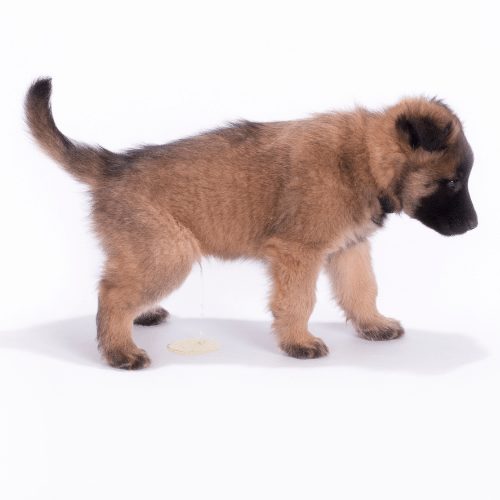
How to stop your puppy from peeing inside
Let’s start at the beginning. Dogs are naturally clean animals that tend to not want to relieve themselves in what they consider their living quarters.
When puppies are first born, their mother clean them up every time they relieve themselves and keeps their whelping box squeaky clean. She teaches your puppy early on that cleanliness is a part of life.
Later, as they slowly learn to walk many breeders keep a litterbox with wood shavings in their puppy pen so that they can do their business in there.
This is where it gets tricky: Young puppies are actually pretty good at using the right potty area in a small space. They are however not very good at understanding that your whole house does not contain a place to go.
Until your puppy moves in with you, his whole life has been restricted to a rather small area. Absolutely no breeder or rescue worker lets a litter of puppies have the run of the house – they would destroy it very quickly.
Now that you adopted the puppy, he probably has a multitude of the space he used to have. He does not understand how there can possibly not be a bathroom space in all these rooms and hallways in your house.
He will probably make an effort to pick a quiet spot that is not very frequented by the family, such as a corner in your office, and decide that this is where he will go to the bathroom.
In order to stop him from peeing inside, you need to restrict the space he has access to!
My puppy won’t potty-train
Feel like your stubborn puppy just will not potty-train? Here are our solutions for the most common potty training problems.
My puppy won’t pee outside, then pees inside
Do you feel like your pup is waiting until you bring him inside, then he pees?
It’s not enough to open the door to the yard or install a doggy door and hope that your puppy will go outside to do his business in the beginning. Chances are that he might go outside, but then get distracted – he starts playing with a leaf, or sniffing or digging – and forgets all about the peeing. Then he comes back inside where all of a sudden he “remembers” he had to potty – and he has an accident.
If you don’t see what he is actually doing outside, you cannot be sure that he urinated – if you stay inside it can also happen that your puppy only “squeezes out a few drops” because he wants to get back in and be with you fast.
The best way to ensure your puppy empties his whole bladder is to go with him and wait until he is done. For a puppy who gets distracted easily, use a leash to keep your puppy close by you and prevent him from running off and starting to play. That way you can also give him a treat or play with him as positive reinforcement after he has done his business.
These potty breaks need to happen very, very frequently in the beginning.
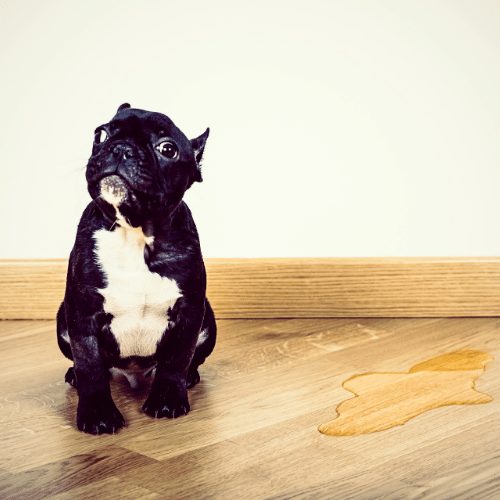
How often does an 8 week old puppy pee?
For a 2 months old puppy I recommend taking him out after waking up, after eating, after playing, and every waking 20min regardless of the activity. At that age he cannot yet go for long period of time without needing bathroom breaks.
If your puppy plays for a long time, he might also need to be taken out during his playtime. It is a good idea to keep an eye on your watch or even set timers to help you stay on track.
Learn his cues: before he goes he will sniff the ground and start turning in a circle, that is when you pick him up and take him outside. (Once you observe closely, you will notice that the “potty dance” looks quite different from a dog who turns around and lies down when making himself comfortable.)
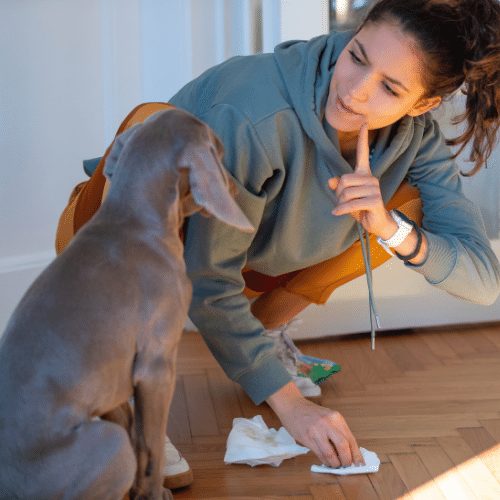
Should you scold a puppy for peeing inside?
Accidents will happen. Do not scold or discipline your puppy – he will not understand you are scolding him for picking the wrong spot. He will think you are unpredictable and become weary of you – we do not want that!
As he grows up, he will naturally learn to hold his bladder for a longer period of time.
If you find a soiled area, clean it up and try to be more observant next time. You can get specialty urine remover products in a pet supply store.
If you catch your puppy in the act, simply pick him up and carry him outside so he can finish there. Do not scold or discipline your puppy! This will only make him scared of you and destroy his trust.
Do you have an older dog that needs potty training? Potty training like this can happen at any age.
My dog pees in house after going outside
In the beginning your puppy might not understand that he is supposed to go to the bathroom when you take him to his designated potty spot. He might tug on the leash, dig in the dirt or try to chase leaves.
It is important that you do not give up thinking “Maybe he does not have to go”. As soon as you taker your puppy back inside, all the distractions are gone and will make him remember he needed to go to the bathroom, and he will do it in some corner.
Instead, once you take your puppy outside, stand with him on a leash at his potty spot until he has gone to the bathroom. As soon as he does, you should reward your puppy. This can be done either in form of treats or games. Over time, he will learn that in order to play and get cookies, he needs to pee first, and get quicker and quicker at doing it.
How long should you use puppy pads?
Ideally, you should not use them at all. The longer you use the potty pad the harder it will become in the future to wean your puppy off them.
- They Don’t Teach Your Puppy To Control His Bladder
If your puppy can go to the bathroom any time he feels like it by using the potty pad, he might never be able to hold his bladder for any longer amount of time. In potty training your puppy, the eventual goal is for him to be able to not pee for several hours if left alone. He can only learn this if we gradually increase the time between his bathroom breaks.
A potty pad makes this approach impossible, as the puppy has to never hold it, but can go at any point in time. This will slow down his learning and can even lead to a life-long dependence on potty pads (more on that below).
- Dogs Are Not Born Knowing How To Pee On A Potty Pad
While the idea of a potty pad that can simply be thrown in the trash might sound a lot more sanitary than a puppy peeing on the floor, the reality is often a different one. The puppy does not know he is supposed to pee on the potty pad, and the potty pad only – this often results in half of the urine on the floor and the other half on the pad or a pile of poop just next to the edge of the potty pad.
In the time that it takes to teach your puppy how to properly use the potty pad, you might just as well teach him to go to the bathroom outside!
- Potty Pads Are Fun To Destroy
Think of a young puppy who sits in his exercise pen, a bit bored and on the lookout for fun. If there is a potty pad in his pen, he will definitely try out his teeth on it. Some dogs do not destroy them too much, while others will tear the whole pad to shreds. Again, not really a gain in hygiene or cleanliness!
- Potty Pads Can Become A Lifelong “Addiction”
Throughout the regular potty training process the dog learns to hold his urine for longer and longer amounts of time. If however he always has a pad available, this learning never happens. While pads can be a temporary option (for example after your dog has had surgery and cannot climb stairs to go outside), they should never be used as a long-term solution for potty training. Every healthy dog (yes, even small ones) is capable of being potty-trained without pads.
Are boy dogs easier to potty train?
No, both males and female puppies are the same when it comes to potty-training. There is no difference in their gender.
Some dogs are easier to potty-train than others, but this mostly comes down to size and breed. Large breed puppies are easier to potty train in general, whereas small breed pups take longer and have more accidents. It does not come down to whether they are boys or girls though!
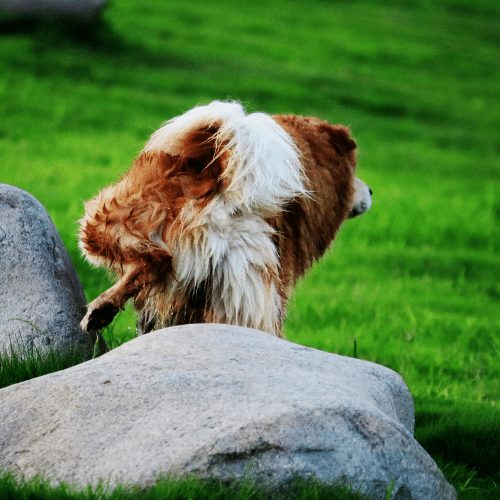
Is there a magic solution?
I am often asked if there is a sure-proof solution to all potty training problems. As you might already expect – the answer is no.
There is no one tool you can buy to keep potty accidents from happening. Supervision and consistency is the key to successful potty training.
Because I hear this question regularly: No, spaying or neutering will not make potty training easier.
(Though once you are ready for that, you should check out Gallant – during your dog/s spay/neuter, add their stem cell banking to set your pup up for a healthy life. Learn More)

